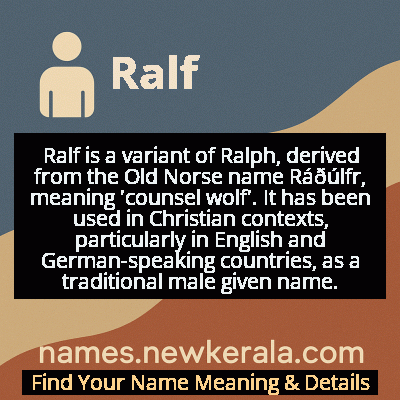Ralf Name Meaning & Details
Origin, Popularity, Numerology Analysis & Name Meaning of Ralf
Discover the origin, meaning, and cultural significance of the name RALF. Delve into its historical roots and explore the lasting impact it has had on communities and traditions.
Name
Ralf
Gender
Male
Origin
Christian
Lucky Number
1
Meaning of the Name - Ralf
Ralf is a variant of Ralph, derived from the Old Norse name Ráðúlfr, meaning 'counsel wolf'. It has been used in Christian contexts, particularly in English and German-speaking countries, as a traditional male given name.
Ralf - Complete Numerology Analysis
Your Numerology Number
Based on Pythagorean Numerology System
Ruling Planet
Sun
Positive Nature
Leaders, ambitious, highly driven, self-reliant, innovative.
Negative Traits
Overly aggressive, domineering, impatient, selfish.
Lucky Colours
Red, orange, gold.
Lucky Days
Sunday.
Lucky Stones
Ruby, garnet.
Harmony Numbers
2, 3, 9.
Best Suited Professions
Entrepreneurs, managers, engineers.
What People Like About You
Courage, determination, leadership.
Famous People Named Ralf
Ralf Schumacher
Racing Driver
6-time Formula One Grand Prix winner and younger brother of Michael Schumacher
Ralf Little
Actor
Starred in 'The Royle Family' and 'Death in Paradise' as DC Neville Parker
Ralf Hütter
Musician
Founding member and lead singer of electronic music pioneers Kraftwerk
Ralf Rangnick
Football Manager
Influential German coach known for developing gegenpressing tactics
Name Variations & International Equivalents
Click on blue names to explore their detailed meanings. Gray names with will be available soon.
Cultural & Historical Significance
During the Viking Age, names containing 'úlfr' (wolf) were particularly common among Norse warriors and leaders, symbolizing ferocity in battle and loyalty to one's clan. The Christianization of Germanic tribes saw many of these pagan names adapted with Christian meanings, with the wolf sometimes representing the protective shepherd or Christ himself as the 'good shepherd' protecting his flock. In modern times, Ralf has maintained its strong, traditional character while adapting to contemporary naming trends, particularly in German-speaking countries where it remains a respected, if less common, choice for boys.
Extended Personality Analysis
Individuals named Ralf are often perceived as strong, reliable leaders with a natural authority that commands respect. They typically possess a balanced combination of strategic thinking (reflecting the 'counsel' element of their name's meaning) and protective instincts (from the 'wolf' symbolism). Ralfs are known for their loyalty to family and close friends, often taking on protective roles within their social circles. They tend to be practical problem-solvers who approach challenges with methodical determination rather than impulsive reactions. While they may appear reserved initially, Ralfs often reveal warm, caring personalities to those they trust.
Their wolf-like nature manifests in strong family bonds, territorial protection of loved ones, and keen intuition about people and situations. Many Ralfs demonstrate entrepreneurial spirit and independence, preferring to lead rather than follow in professional settings. The combination of intelligence and instinct makes them effective in crisis situations where quick thinking and decisive action are required. However, this same combination can sometimes lead to stubbornness or reluctance to change established routines. In relationships, Ralfs value honesty and direct communication, and they typically form deep, lasting bonds with partners who appreciate their protective nature while respecting their need for independence.
Modern Usage & Popularity
Ralf maintains steady but moderate popularity in German-speaking countries and Scandinavia, while being less common in English-speaking nations where the 'Ralph' spelling predominates. In Germany, Ralf ranked around position 150 in popularity during the 1970s but has since declined, reflecting broader trends toward more modern or international names. The name enjoys particular strength in business and professional contexts, where its strong, traditional sound conveys reliability and competence. Contemporary usage shows Ralf as a name that bridges traditional values with modern sensibilities, often chosen by parents seeking a name with historical depth that remains distinctive without being overly unusual. The name's cross-cultural adaptability makes it suitable for international families, while its straightforward pronunciation aids global recognition. Recent years have seen a slight resurgence in traditional Germanic names, potentially benefiting Ralf's usage among parents interested in cultural heritage names with strong meanings.
Symbolic & Spiritual Meanings
The name Ralf carries rich symbolic meaning derived from its Old Norse components 'ráð' (counsel) and 'úlfr' (wolf). This combination creates a powerful archetype of the 'wise protector' or 'strategic guardian.' The wolf symbolism represents loyalty to pack/family, strong survival instincts, intuition, and freedom. Meanwhile, the counsel element signifies wisdom, strategic thinking, and leadership qualities. In metaphorical terms, Ralf embodies the balance between wild nature and civilized reason - the wolf who uses intelligence rather than pure force. This duality makes the name symbolically potent for individuals who navigate complex social or professional environments requiring both instinct and intellect. The 'red wolf' interpretation adds layers of uniqueness and rarity, suggesting someone who stands out while maintaining core strength and family values. In psychological terms, the name represents the integration of primal energy with conscious control, making it symbolically appropriate for leaders, protectors, and innovators who must balance creativity with practicality.

